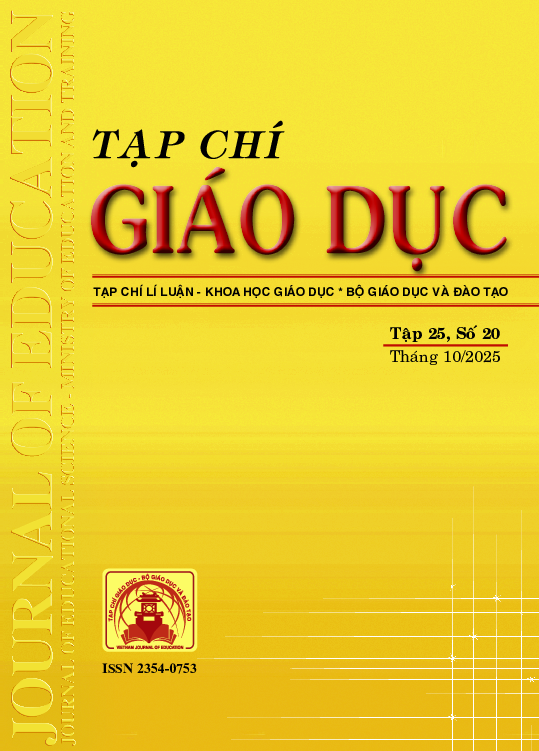Phân tích thư mục về giáo dục STEAM ở bậc đại học: xu hướng hiện tại và định hướng tương lai
Tóm tắt
In recent years, STEAM education has gained increasing attention across various educational levels, particularly in higher education. Many countries regard it as a forward-looking educational model that equips learners with essential skills to cope with social crises, adapt to digital transformation, and contribute to addressing global challenges such as climate change, energy security, and economic growth. This paper presents a bibliometric analysis to explore global trends in STEAM education and identify research gaps based on data retrieved from the Scopus database. A total of 168 relevant articles were selected using specific keywords “STEAM”, “higher education”, “university”, “college”; and VOSviewer software was employed to visualize and analyze the relationships among key elements in this field. The findings offer an overview of the development, major themes, and potential directions of STEAM education, particularly at the tertiary levels. Additionally, the study highlights a lack of STEAM-related research on learners with artistic talents to enhance logical thinking skills, utilize advanced modern technologies in creating artwork in response to societal needs - an area that presents both challenges and opportunities for further development in Vietnam.
Tài liệu tham khảo
Anito Jr., J. C., & Morales, M. P. E. (2019). The Pedagogical Model of Philippine STEAM Education: Drawing Implications for the Reengineering of Philippine STEAM Learning Ecosystem. Universal Journal of Educational Research, 7(12), 2662-2669. https://doi.org/10.13189/ujer.2019.071213
Badmus, O. T., & Omosewo, E. O. (2020). Evolution of STEM, STEAM and STREAM Education in Africa: The Implication of the Knowledge Gap. International Journal on Research in STEM Education, 2(2), 99-106.
Colucci-Gray, L., Burnard, P., Cooke, C., Davies, R., Gray, D., & Trowsdale, J. (2017). Reviewing the potential and challenges of developing STEAM education through creative pedagogies for 21st century learning: How can school curricula be broadened towards a more responsive, dynamic and inclusive form of education? [Report]. British Educational Research Association. https://wrap.warwick.ac.uk/id/eprint/102185/
European Commission (Ed.). (2015). Science education for responsible citizenship: Report to the European Commission of the expert group on science education. Publications Office. https://doi.org/10.2777/13004
Hong Chuyen, N. T., & Vinh, N. T. (2023). An Empirical Analysis of Predictors of AI-Powered Design Tool Adoption. TEM Journal, 1482-1489. https://doi.org/10.18421/TEM123-28
Mezinska, S., Abolina, A., & Lubkina, V. (2024). Design-driven innovation in STEM disciplines in higher education: The role and impact of transversal competences. Journal of Open Innovation: Technology, Market, and Complexity, 10(4), 100429. https://doi.org/10.1016/j.joitmc.2024.100429
Roinioti, E., Cherouvis, S., Filipowicz, S., Addis, A., Chappell, K., & Karpouzis, K. (2025). A Scoping Review of STEAM Policies in Europe. Education Sciences, 15(6), 779. https://doi.org/10.3390/educsci15060779
Tải xuống
Đã Xuất bản
Cách trích dẫn
Số
Chuyên mục
Giấy phép

Tác phẩm này được cấp phép theo Ghi nhận tác giả của Creative Commons Giấy phép quốc tế 4.0 .












